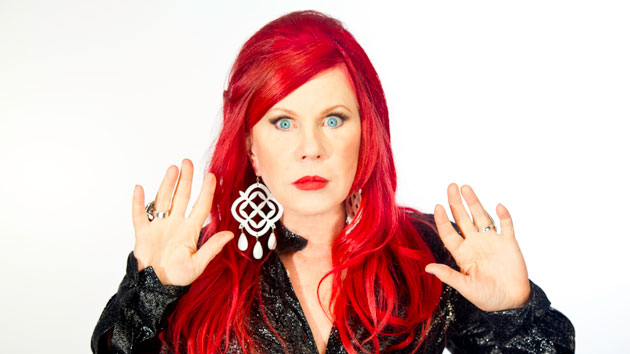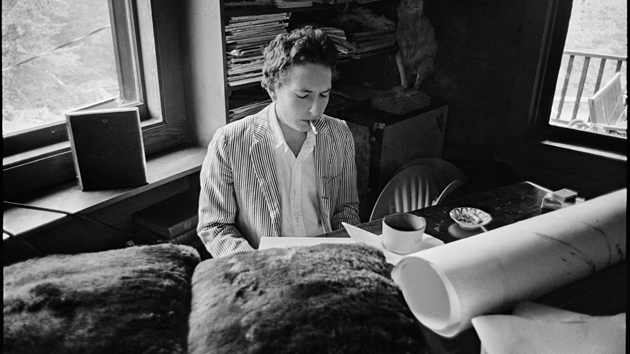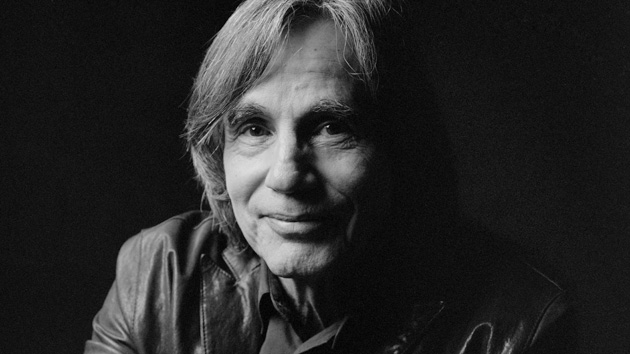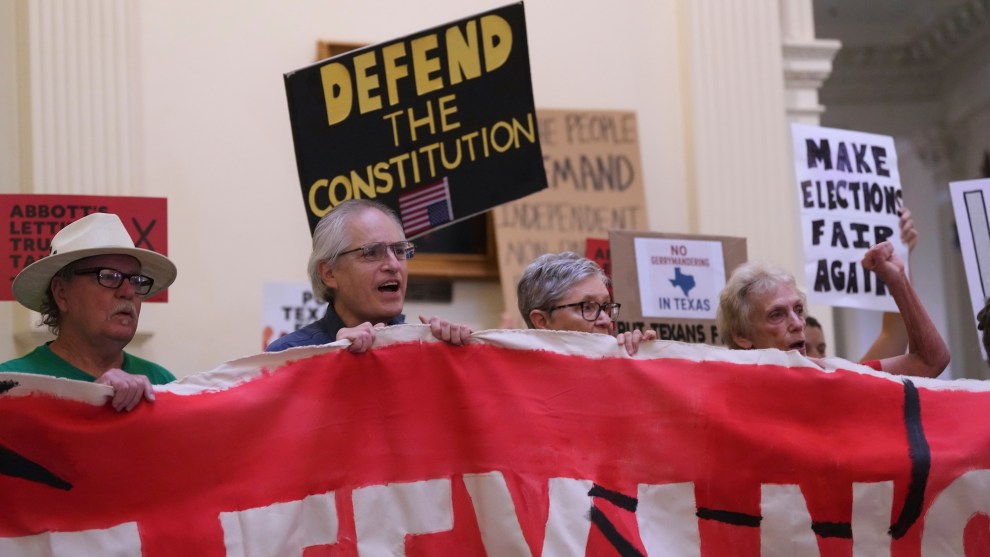
Kate Pierson of the B-52sMonica Coleman
The B-52s have kept their glittery, campy party vibe going for nearly four decades, from early jams like “Rock Lobster,” through later hits like “Love Shack,” right up to 2008 with the release of their well-received album Funplex. With retro outfits, beehive hairdos, and funky dance moves, they made the thrift-store esthetic cool before Macklemore was even born. But while the band continues to perform live, founding member Keith Strickland announced in 2012 he would stop touring and no new music appears to be on the horizon.

Yet Kate Pierson, the band’s bassist, keyboard player, and singer, shows no signs of slowing down. This month, at age 66, she’ll release her first solo album, Guitars and Microphones. It pulses with energy and spunk powered by Pierson’s towering vocals and melodies from the enigmatic pop artist Sia, who produced the album.
“Sia and I were laughing all the time,” said Pierson about making the album. “It was a real fun process, light-hearted, it was magical.”
Pierson spoke with me about her new project from her snowed-in house in Woodstock, New York, where, when not on the road, she leads a quiet life with her partner Monica Coleman and their dogs. We covered the excitement and exhaustion of touring, ageism in rock and roll, Glee‘s rendition of “Rock Lobster,” and the trans community’s reaction to her new song “Mister Sister.”
Mother Jones: In Guitars and Microphones, you sing about everything from bucking sexist stereotypes to freeing sea turtles. Are you intentional about creating themes when you set out to make an album, or do you realize what they are afterward?
Kate Pierson: I think the latter in the case. I had lyrics for most of the songs, an idea of them, a title. But there was no overarching theme or anything. It was just collaborating with different people and seeing what chemistry bubbles up.
MJ: Yeah, I noticed that pretty much every song had multiple people working on it, including Sia, who performed at this year’s Grammy Awards, and Nick Valensi of the Strokes.
KP: Most of it was Sia, who helped me get this whole album going. I started putting together a solo album like twelve years ago, but then the B-52s started writing Funplex and I dropped that. I had even done a little tour with those songs and performed at Joe’s Pub [in New York City]. Sia said she would work with me—she was a friend of ours—and we started going to these people that she had collaborated with before, like Nick Valensi. Usually that person was the instrumentalist, like Nick Valensi would start playing the bass line and we would jam to that. Or when I worked with Dallas Austin he started playing a keyboard part, and Chris Braide had sent me a track and I wrote “Wolves” to that track.
MJ: How has it been to perform your solo songs?
KP: It’s a whole different thing because even though I used to play the bass lines and the keyboard part on the B-52s up until Cosmic Thing, I miss [the guitar]. I feel like playing the guitar gives you an entry into the song that’s totally different than when you are just a singer; it’s like you are in the music.
MJ: I’ve heard how grueling it can be to tour, and the B-52s have been touring for close to 40 years. But you don’t seem like you are lacking energy or excitement to keep going.
KP: I think some of the reason the B-52s stopped touring for this past year was it was exhausting (laughs). I mean it takes incredible fortitude to keep on the road, even though it’s fun and it’s rewarding and you can’t complain, it’s just a great life, but, you know, it takes a lot of energy. We are only doing a few shows this whole summer, no one really wants to tour that much in the band except me. I’m really raring to go because it’s really fun to do new songs, and these songs are really coming out to be great live.
MJ: Were there ever points when you thought ‘I’m just going to do something completely different with my life’?
KP: Well, Keith [Strickland] quit [touring] a few years ago. He’s still part of the band but that’s exactly how he felt, like if I want to do artwork and photography and pursue spiritual paths, I just can’t keep touring. For me, doing this new solo project is a different turn. We [also] have a different life up here in Woodstock. We are just up here with our dogs on the side of this mountain; we aren’t really into going to clubs and rock and rolling all the time. So it’s a totally different lifestyle. We have a garden. I was home all summer and even though I was practicing guitar and stuff, we were gardening and canning. There’s this whole split personality thing of being a farm girl and a rock and roll girl.
MJ: Have you noticed a double standard between female and male rock musicians as they get older?
KP: There is definitely the double standard. But even the Rolling Stones now, every time you read something about them it always mentions their age and how long can they go on? I think there are certain genres of music where people are allowed to go on, but there is something about rock and roll, I guess because it originally started out to be a teenage rebellion.
Of course there are older people that are still rockers. I just did this John Lennon tribute and I got to sing with Debbie Harry. I mean she’s timeless. Patti Smith. There is definitely a double standard but I don’t feel it because we are just moving ahead, you know, to hell with whatever anyone thinks, that’s not going to stop us. There is definitely a very fierce age-ist kind of thing, but I think there is also a lot of respect for older artists that have done it and seen it and played it.
MJ: I’m wondering about the difference between being in the B-52s when you guys were young rock stars starting out in Athens, Georgia and now, being much older and possibly playing for a different age group.
KP: We have a very mixed audience: You see lots of young kids, and you see middle-aged people and older people. It’s great to see younger people in the audience, and they get it, and they’re not being dragged there by their parents usually, they’re there on their own volition. “Love Shack” is such an eternal kind of song, at karaoke people do it. They just did “Rock Lobster” on Glee. I think because of shows like Glee and YouTube, all this older stuff is being mined, it’s like gold, and young people really respond to that.
MJ: The B-52s have been important for many people in the gay community—several of its members are out—and the band has been involved in other social issues, as well. Were the B-52s intentional about being a politically or socially conscious band?
KP: Our intention when we started was just to amuse ourselves. Fred [Schneider] and Keith were gay and they didn’t really have to come out, you know, it was in this time in Athens when that was very accepted. It was still kind of hippie at that time and it was the University of Georgia and there is an art school there. [For] our fringe group of friends that was a non-issue; it wasn’t like anyone had to really announce that they were gay or feel like an outsider. We knew we were different and we wanted to make it okay. But we weren’t consciously ever trying to be different, like let’s be freaky or shock people. We had this style to amuse ourselves and we liked to crash parties and wear wigs and just have fun with it.
MJ: “Mister Sister” on Guitars and Microphones has a very direct message about transcending gender boundaries. After you released the music video for the song you were quoted as saying you wanted the song to become a “trans anthem,” which received some strong reactions from people in the trans community. Were you surprised by how people responded?
KP: Oh, I was just totally shocked. Because my original quote was ‘”Mister Sister” is inspired by all who are transgender, LGB, multidimensional and still transcending’ [and it] is meant to empower anyone who feels betrayed by the mirror, which is a lyric in the song. And then it was sort of twisted around when Huffington Post asked me specifically why did you want to write a song about a trans girl. It wasn’t meant to be that, it was meant to be exactly as I said, anyone, really, who feels betrayed by the mirror. It could be about a young boy or girl trying to get in touch with their inner gender experience. And I said at the end of this I hope this becomes a trans anthem, and then they put in parentheses “gender” so they kind of changed the nature of that quote.
But at the same time I was shocked because I wasn’t aware of the controversy going on within the trans community about whether or not you could use tranny old school or never say that word or whether you should be hard-line wanting to separate yourselves from the gay community. My partner Monica made a very big effort to dialogue on Facebook with a couple of people who were even more vociferous about it, in particular Fallon Fox who is a mixed martial arts trans woman. We got a dialogue going and I got to a better understanding of what the trans community wants. Ultimately, I feel like I learned a lot.
MJ: I wanted to ask about Athens, Georgia, where the B-52s got their start in the 1970’s. It seems like it was an amazing scene. What is it like now? If you were starting out again as a musician is there a place in the US today that you would go?
The B-52s perform in Athens, Georgia in 1978.
KP: It’s funny because I moved to Athens to do a back-to-the-land thing and farm. I had rented this place for $15 a month and raised goats and had a garden and there were two feed stores in town and there was the farmer’s hardware, and there really wasn’t much, no place to play, no music scene. So when the B-52s got together, we were just doing music to amuse ourselves and we were really kind of the first. There was one new wave-y punk band in Atlanta, and they were the ones that encouraged us to go and bring a tape to New York.
Now there is such a scene there, everyone is in four bands, it’s still like this magical place but it’s totally different. So if I were to start again I guess I would go to Athens or Austin. But in some ways, I think being in a place where there is nothing happening is also very inspiring because you have to make your own fun, you are not reliant on imitating any other bands. I think that’s part of the reason we were so unique, it was just us in this bubble, and we were able to each put our wacky personalities together and come out with this five-headed monster, this bright blend of our personalities. There’s nothing like it, there is still nothing really like the B-52s.
















